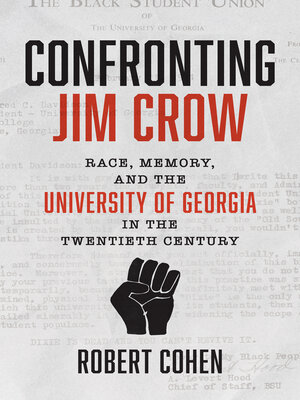Confronting Jim Crow
ebook ∣ Race, Memory, and the University of Georgia in the Twentieth Century
By Robert Cohen

Sign up to save your library
With an OverDrive account, you can save your favorite libraries for at-a-glance information about availability. Find out more about OverDrive accounts.
Find this title in Libby, the library reading app by OverDrive.



Search for a digital library with this title
Title found at these libraries:
| Library Name | Distance |
|---|---|
| Loading... |
Since the onset of the Black Lives Matter protests in 2020 following the murder of George Floyd, America has grappled with its racial history, leading to the removal of statues and other markers commemorating pro-slavery sympathizers and segregationists from public spaces. Some of these white supremacist statues had stood on or near college and university campuses since the Jim Crow era, symbolizing the reluctance of American higher education to confront its racist past.
In Confronting Jim Crow, Robert Cohen explores the University of Georgia’s long history of racism and the struggle to overcome it, shedding light on white Georgia’s historical amnesia concerning the university’s role in sustaining the Jim Crow system. By extending the historical analysis beyond the desegregation crisis of 1961, Cohen unveils UGA’s deep-rooted anti-Black stance preceding formal desegregation efforts. Through the lens of Black and white student, faculty, and administration perspectives, this book exposes the enduring impact of Jim Crow and its lingering effects on campus integration.
In Confronting Jim Crow, Robert Cohen explores the University of Georgia’s long history of racism and the struggle to overcome it, shedding light on white Georgia’s historical amnesia concerning the university’s role in sustaining the Jim Crow system. By extending the historical analysis beyond the desegregation crisis of 1961, Cohen unveils UGA’s deep-rooted anti-Black stance preceding formal desegregation efforts. Through the lens of Black and white student, faculty, and administration perspectives, this book exposes the enduring impact of Jim Crow and its lingering effects on campus integration.







